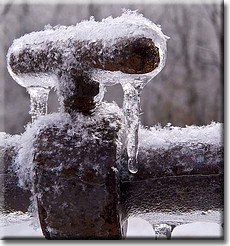Preventing Frozen Pipes in Your Home's Plumbing System
If you have never had a problem with frozen water pipes during the cold winter months, then you are certainly lucky. Thousands of homeowners each year are shocked to wake up one morning and discover that no water comes from the tap when they turn the handle, and then soon learn that a water pipe has frozen or even burst in their home's plumbing system. Both copper and PVC (plastic) pipes are subject to bursting if conditions are right and your home's plumbing system is unprepared for bitter cold weather. Cleaning up after a frozen pipe has burst is often not as simple as calling the local plumber out. Just a 1/8th inch crack in a pipe can cause hundreds of gallons of water to leak from your home's plumbing system in one day. This can be a huge mess, and can be very disrupting for the homeowner who has to deal with the cleanup and be without water while the burst pipe is located and repaired.
Before Cold Weather Sets In - Precautions
You can take precautions to make sure that your home is protected from the danger and expense of frozen pipes before cold weather sets in. Your first line of protection is to insulate the pipes in your home from the cold. This includes pipes in your home's attic and crawl spaces. Exposed pipes are the most likely to freeze, and as a general rule of thumb, the better insulated your pipes are, the more protection they will have from freezing. You can also use temperature controlled heat cables and/or heat tape to wrap your pipes. A word of caution about heat tapes and cables to ensure your safety and that of your family: always look for products that have the UL (Underwriters Laboratories) seal and be certain that the tape or cable that you buy is made for the purpose you have whether it be interior or exterior. Read the manufacturer's instructions for operation and installation carefully and follow their guidelines for safe use of these types of products. Another great barrier against the cold that you can use is sealing air leaks in the home that let cold air in - such as those around dryer vents, pipes, and electrical wiring. These can be sealed using insulation or caulk. In areas of the country where the cold can be severe, even the tiniest of openings can allow enough cold air in to freeze a pipe and cause a huge problem. Don't forget the outdoor plumbing that you have - be sure to disconnect any garden hoses and shut off the drain to the pipes that go to outside spigots if possible.
During a Cold Snap - Prevention
Even with the above steps, an ounce of prevention is worth a pound of cure, especially when it comes to your water lines freezing up. You can take these additional precautions to avoid a pipe burst disaster:
- Allow warm water to drip in each of your home's faucets at night. Just a trickle is all it takes to keep the water moving and not freezing up in the pipes.
- Keep cabinet doors open to allow heated air to reach the pipes underneath your sinks and appliances that are not heated. This is especially important if the sink or appliance is installed near an exterior wall where the temperature will be colder.
- If you must be away overnight during the cold months of the year, set your home's thermostat to at least 55 degrees Fahrenheit, shut off and drain the water system, and ask someone to check in on your home to be certain it is warm enough to keep your pipes from freezing.
What To Do When It's Too Late - Dealing With Frozen Pipes
Turning on the faucets and finding that nothing comes out is a sign that your pipes have frozen and possibly burst. When this happens, leave the faucet on and call your plumber immediately. You should also turn off your home's water at the main shut off. It is a good idea to let everyone in the house know where the water shut-off valve is located and how to open and close the valve. Don't take chances by trying to thaw the frozen pipe with an open flame or torch. Some people have success with using a hair dryer on a warm setting to thaw frozen pipes themselves by working from the pipes under the faucet and outwards towards the coldest pipe section that is accessible. A word of caution, however: if you have standing water in your home, using a hair dryer or other appliance near the standing water can cause you to be electrocuted, which can be fatal. In instances like this, paying the additional cost to hire a plumber is money well-spent.
|
|



